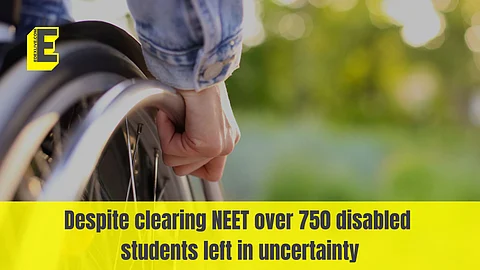

Over 750 students with disabilities qualified National Eligibility-cum-Entrance Test - Undergraduate (NEET-UG) 2025, yet systemic failures by medical authorities have left them stranded, despite clear Supreme Court directives.
When NEET-UG results were announced on June 14, what should have been a moment of celebration turned instead into confusion and despair.
The National Medical Commission (NMC) and Directorate General of Health Services (DGHS) offered no clarity on applicable disability guidelines, no update on functioning assessment centers, and failed to launch a mandatory portal mapping accessible medical colleges, all measures directed by the highest court.
Despite a steady stream of judicial interventions in recent years, the enforcement of these rulings remains conspicuously absent. The NMC missed its April 15 deadline to revise its guidelines. The DGHS has yet to comply with court orders to expand the number of disability assessment boards across the country.
“The NMC is quick to demand Yoga Day celebration reports with same-day uploads,” says Dr Satendra Singh, a disability rights activist whose work has shaped several landmark judgments. “But when it comes to obeying Supreme Court orders on disability guidelines, it’s radio silence.”
He notes that behind the delay is not inefficiency but institutional apathy and an unwillingness to include disabled voices in policy-making.
Even students holding valid government-issued disability certificates are being disqualified by erratic assessments.
Lakshay Sharma, who is visually impaired, was declared to have “zero per cent” disability by Dr Ram Manohar Lohia (RML) Hospital, a blatant error later overturned by the Chief Commissioner for Persons with Disabilities (PwD). In earlier years, Safdarjung Hospital similarly deemed Laxmi Chaudhary (2022) and Usman (2020) ineligible, only for those decisions to be reversed by court intervention or alternative evaluations.
“These errors happen primarily due to a lack of understanding, compounded by systemic exclusion of persons with disabilities from decision-making roles,” Dr Singh explains. “The people drafting these guidelines often come from positions of privilege and critically, do not have disabilities themselves.”
He argues that the result is a rigid, medicalised framework disconnected from the inclusive principles of the Rights of Persons with Disabilities (RPwD) Act, 2016.
One of the most egregious exclusions, the requirement that candidates have “both hands intact,” was finally struck down by the Supreme Court in February 2025. Justice Viswanathan called the rule “a mockery of the principle of reasonable accommodation” and said it “reeks of ableism.”
Judicial pressure has been unrelenting. The Delhi High Court, in 2022, ordered the NMC to amend discriminatory policies in the Neha Pudil case, a mandate that remains unfulfilled.
In Omkar Gond, the Supreme Court called for a new appellate mechanism, revised assessment norms, and an online portal listing accessible institutions, yet only the NEET brochure appeared. “The brochure appeared, but the promised reforms did not,” remarks Dr Singh.
Students like Kabir Paharia, who scored 542 in NEET, were denied admission repeatedly. He secured relief just a day before the exam after proving in simulation labs that he could meet clinical competencies. The court reminded authorities: “Reasonable accommodation is not charity but a fundamental right.”
While such legal wins have set important precedents, they also underscore a grim reality, that justice for disabled students often arrives only after drawn-out, exhausting litigation. Structural reform remains elusive. As Dr Singh notes, “ground realities remain unchanged.”
The NMC continues to operate just 16 disability assessment centers across 10 or 11 states, forcing many students to travel long distances just to get certified. “That’s both unfair and discriminatory,” Dr Singh says.
The Supreme Court had directed DGHS to ensure at least one such centre in every state, include doctors with disabilities on every board, and train all members on disability law, all of which remain unfulfilled.
Even the committee formed to revise NMC’s guidelines has drawn sharp criticism. “Three of the four members were the very people responsible for the earlier discriminatory guidelines,” Dr Singh points out. “And the one doctor with a disability was from an institute that doesn’t even offer undergraduate medical education.” Unsurprisingly, the committee failed to meet its April 15 deadline.
The emotional and mental toll on students is profound. “NEET happens just once a year, and students dedicate months, sometimes years, to prepare,” Dr Singh says. “For students with disabilities, that pressure is compounded by constant uncertainty: Am I even eligible? Will the guidelines change again? Will I be rejected despite qualifying?” He adds, “The fear is not hypothetical, it’s deeply lived. Many are exhausted not just by academic rigor but by the unpredictability of the system. Only those with the strength and resources to go to court get relief.”
The deeper crisis, Dr Singh argues, is a cultural one, a profession that still equates disability with incompetence. “Until the right people with the right understanding are included in these processes, the errors, exclusions, and injustices will continue, no matter how many times the courts intervene,” he says. “It is essential to involve doctors with disabilities. They bring not just clinical knowledge, but lived experience, which is crucial for building fairer systems.”
The Supreme Court has emphasised the same, urging the medical establishment to “rethink how it defines competence, especially in light of assistive technology and simulation-based training.”
“What we are witnessing is institutionalised impunity,” says Dr Singh. “The NMC and DGHS have now routinely defied not just one, but multiple High Court and Supreme Court directives. Why then has no contempt proceeding been initiated?”
Every day of inaction, he warns, is “a day of stolen dreams, heightened anxiety, and unconstitutional discrimination against India’s most marginalised NEET qualifiers.”
As he concludes: “The qualified students caught in uncertainty have already proven their merit. Now, the system must prove its commitment to justice.”
